Ditapis dengan
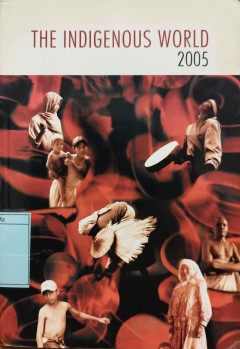
The Indigenous World 2005
The year 2004 marked the end of the first International Decade of the World's Indigenous People and, for many, this was an opportunity to look back and assess the progress made since 1995
- Edisi
- -
- ISBN/ISSN
- 8791563054
- Deskripsi Fisik
- 567 p. ; ill. ; 21 cm
- Judul Seri
- -
- No. Panggil
- 307.7 THE
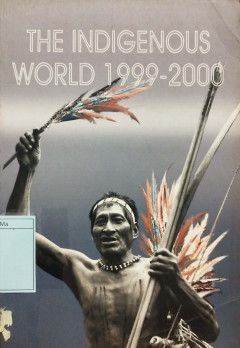
The Indigenous World 1999-2000
The response received so far from readers of the yearbook has largely been positive
- Edisi
- -
- ISBN/ISSN
- 8790730321
- Deskripsi Fisik
- 431 p. ; ill. ; 21 cm
- Judul Seri
- -
- No. Panggil
- 307.7 THE
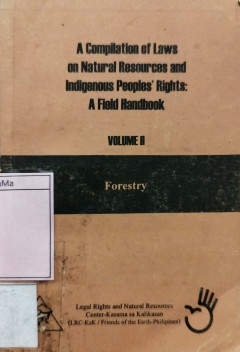
A Compilation of Laws on Natural Resources and Indigenous People's Rights : a…
Protected Area Environment Biosprospecting
- Edisi
- Volume III
- ISBN/ISSN
- -
- Deskripsi Fisik
- , 198 p. ; 11 cm
- Judul Seri
- -
- No. Panggil
- 634.9 COM
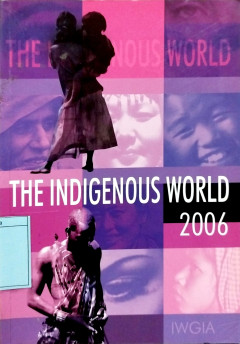
The Indigenous World 2006
Although 2005 saw significant progress made in term of recognising indigenous people's right, this first year in the second UN decade of the World's Indigenous People
- Edisi
- -
- ISBN/ISSN
- 8791563186
- Deskripsi Fisik
- 575 p. ; ill. ; 21 cm
- Judul Seri
- -
- No. Panggil
- 307.7 THE

The Indigenous World 2004
The impression one has on reading this year's contributions to the indigenous world is that, despite notable advances, the situation of indigenous peoples still remains extremely precarious and even, in many cases, alarming.
- Edisi
- -
- ISBN/ISSN
- 8790730836
- Deskripsi Fisik
- 472 p. ; ill. ; 21 cm
- Judul Seri
- -
- No. Panggil
- 307.7 THE
Engaging the UN Special Rapporteur on Indigenous People : opportunities and c…
The Philippine Mission of the UN Special Rapporteur on the Situation of Human Rights and Fundamental Freedoms of Indigenous People.
- Edisi
- -
- ISBN/ISSN
- 9719284641
- Deskripsi Fisik
- , 275 p. ; tab. ; 22 cm.
- Judul Seri
- -
- No. Panggil
- 390.02 VIC e
Dynamics of the Charcoal and Indigenous Timber Trade in Zambia : a scoping st…
This paper addresses the increasing concern over the contribution of charcoal production and commercial timber extraction to deforestation and forest degradation in Zambia. This scoping study notes that rural communities in Zambia are fully involved in forest management and do obtain direct incentives from these forests, a critical condition for realising sustainable forest management. With tra…
- Edisi
- -
- ISBN/ISSN
- -
- Deskripsi Fisik
- xi, 78 p. ; ill. ; tab. ; 30 cm.
- Judul Seri
- -
- No. Panggil
- 662.7 DYN
Indigenous Peoples, Forests and REDD Plus : sustainig and enhancing forests t…
Indigenous peoples' efforts to protect and conserve their forests and to sustainably manage these prove that they are the ones who have contributed significantly in reducing emissions from deforestation and forest degradation, even before REDD came into the picture. If their customary institutions and practices for managing forests and other resources are reinforced, their contributions will be…
- Edisi
- -
- ISBN/ISSN
- 9789710186013
- Deskripsi Fisik
- xiv, 187 p. ; ill. ; tab. ; 23 cm.
- Judul Seri
- -
- No. Panggil
- 634.95 IND
The Permanent Forum on Indigenous Issues
In recent years, one of the main priorities of IWGIA's publications has been to circulate information on the UN Permanent Forum on Indigenous Issues. IWGIA's publication, The Indigenous World, includes regular yearly updates on recent events in this re- gard. In 1998, IWGIA published the book The Per- manent Forum for Indigenous Peoples - the struggle for a new partnership. Now, in 2003, wit…
- Edisi
- -
- ISBN/ISSN
- -
- Deskripsi Fisik
- , 104 p. ; ill. ; 25 cm.
- Judul Seri
- -
- No. Panggil
- 390.02 LOL t
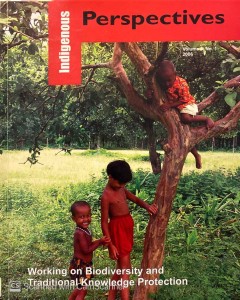
Indigenous Perspectives Volume VIII, Number I A Journal of Tebtebba Foundatio…
Indigenous peoples occupy the most biologically diverse areas in the world. Through their traditional knowledge and practices, they have sustainable utilized, nurtured and protected their lands and the resources within it. For them, land and life is inextricably linked. It is in their ancestral lands that they practice their way of life their cultures, traditions, rites, languages that has sust…
- Edisi
- -
- ISBN/ISSN
- 16554515
- Deskripsi Fisik
- , 97 p. ; ill. ; tab. ; 16 cm.
- Judul Seri
- -
- No. Panggil
- 390.02 IND
 Karya Umum
Karya Umum  Filsafat
Filsafat  Agama
Agama  Ilmu-ilmu Sosial
Ilmu-ilmu Sosial  Bahasa
Bahasa  Ilmu-ilmu Murni
Ilmu-ilmu Murni  Ilmu-ilmu Terapan
Ilmu-ilmu Terapan  Kesenian, Hiburan, dan Olahraga
Kesenian, Hiburan, dan Olahraga  Kesusastraan
Kesusastraan  Geografi dan Sejarah
Geografi dan Sejarah